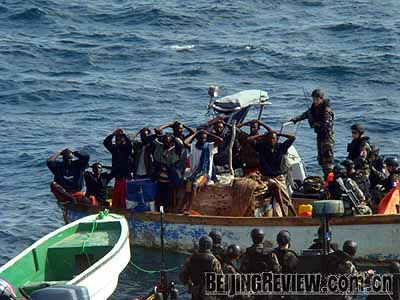|
Somalia has come into the international media spotlight because of the high-profile pirate attacks off its coast. But piracy is only part of the Horn of Africa country's ordeal. Somalia has been embroiled in armed conflicts between feuding warlords since 1991, without a central government that can put the country under effective control. In an interview with Beijing Review reporter Yan Wei, Somalia's Ambassador to China Mohammed Awil called on the international community to help his war-torn country fight piracy, stop illegal fishing and waste dumping in Somali waters and achieve peace and reconciliation.
 |
|
"We ask the international community to support the AU's peacemaking efforts, especially AMISOM." --Mohammed Awil, Somalia's Ambassador to China (WEI YAO) |
The ambassador also gave positive evaluation to China's naval presence on Somali waters. Excerpts of the interview follow:
Beijing Review: Why is piracy so rampant in the Gulf of Aden and off the Somali coast?
That is a question everyone is asking. There has not been any piracy before. Even when Somalia did not have a government, there was no piracy off its coast. Why this time? There are two groups of pirates.
One group funds the war in Somalia by committing piracy. After Somalia's security forces took over the areas formerly under their control, they did not have income to continue the war. So they went to the seaside to get shortcut money to continue the war. They are extremists who do not want peace or a political solution.
The other group of pirates is backed by a hidden hand. Some countries are supporting them in order to achieve their hidden agenda. The pirates are so sophisticated that they know exactly which ships are passing. Even though there are navies, nobody captures them. We don't want to tell who they are. but sooner or later their hidden agenda will come out.
What measures has the Somali Transitional Federal Government taken to address the problem?
We told the international community two years ago that there was a piracy problem off the Somali coast. We wanted to build up our coast guard, so that they could patrol the waters to ensure safety there. We asked the international community for support, but nobody paid much attention. Now the situation has gotten out of control and it has become an international issue. That's why we have asked the UN Security Council several times to invite international navies to come and fight piracy.
How many countries currently have anti-piracy missions there? How does the Somali Government cooperate with them?
All permanent members of the UN Security Council are there. [Besides,] we have countries like Denmark, Germany, Italy, Canada, Saudi Arabia, Iran, India and Malaysia. It is very important for us to work with vessels from all these countries operating in the waters of Somalia.
|
 |
|
EMBATTLED CAPITAL: Members of the anti-government group Al Shabaab on a military vehicle in Mogadishu, capital of Somalia, on December 27, 2008 (XINHUA) |
|
 |
|
CAPTURED: French soldiers arrest presumed Somali pirates in the Gulf of Aden after a French warship foiled their attempt to seize two cargo vessels on January 4 (XINHUA/AFP) |
Cooperation is going on. In early January, the French navy captured some pirates and handed them over to the autonomous region of Puntland for legal proceedings. We are coordinating and cooperating with all international naval vessels on Somali waters.
China recently sent a naval fleet to Somali waters on an escort mission. What are your comments?
Mohammed Awil: China is a permanent member of the UN Security Council and an important part of the international community. Our comment on this issue is that China has taken a great decision to protect the safety of Somali waters and help the Somalis by escorting ships carrying humanitarian assistance for them. This shows how China is concerned about world peace.
| 